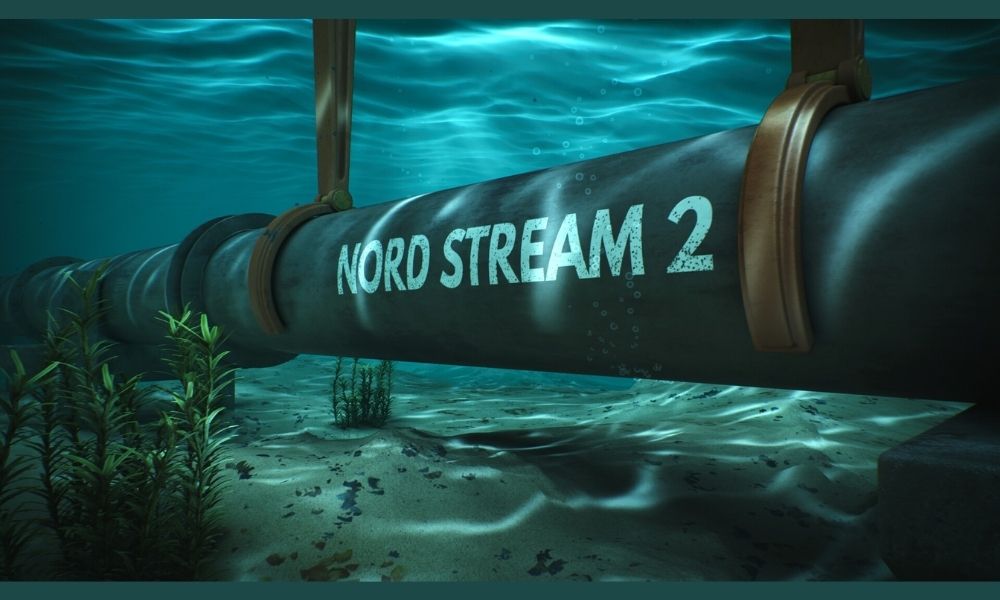The Nord Stream pipeline, a controversial project that aims to transport natural gas from Russia to Germany, has been a topic of heated debate for years. While proponents argue that it will provide a reliable and cost-effective energy supply for Europe, opponents claim that it will increase Europe’s dependence on Russian gas and pose a threat to the continent’s energy security. However, there is another aspect of the Nord Stream project that often goes unnoticed – the potential for sabotage.
In recent years, there have been several incidents of sabotage on pipelines in Europe, including the Nord Stream pipeline. These incidents have raised concerns about the safety and security of the pipeline and its potential impact on the energy market. In this article, we will explore the concept of Nord Stream sabotage and examine who stands to benefit from it.
Contents
What is Nord Stream?
The Nord Stream pipeline is a natural gas pipeline that runs from Russia to Germany, passing through the Baltic Sea. It is owned and operated by Nord Stream AG, a consortium of five major energy companies – Gazprom (Russia), Wintershall (Germany), E.ON (Germany), Gasunie (Netherlands), and ENGIE (France). The pipeline has a total length of 1,224 kilometers and a capacity of 55 billion cubic meters of gas per year.
Read:Croatian President Criticizes Display of Israeli FlagThe project was first proposed in 2005 and has faced significant opposition from various countries, including the United States, Ukraine, and several European Union (EU) member states. The main concerns revolve around the potential impact on Europe’s energy security and the continent’s dependence on Russian gas.
What is Sabotage?
Sabotage is the deliberate destruction or damage of property or equipment, usually for political or military purposes. In the context of pipelines, sabotage can take various forms, such as physical attacks, cyber-attacks, or intentional leaks. These acts can disrupt the flow of gas, cause environmental damage, and pose a threat to public safety.
Sabotage on pipelines is not a new phenomenon. In fact, it has been used as a tactic in conflicts and wars for centuries. However, with the increasing importance of pipelines in the global energy market, the potential for sabotage has become a significant concern for energy companies and governments.
Who Benefits from Nord Stream Sabotage?
While sabotage on the Nord Stream pipeline may seem like a random act of violence, there are several parties that could potentially benefit from it. Let’s take a closer look at each of these parties and their motivations.
Read:Thunberg’s Controversial Palestinian Solidarity Post1. Competing Energy Suppliers
One of the main beneficiaries of Nord Stream sabotage could be competing energy suppliers, particularly those who are not part of the consortium that owns the pipeline. By disrupting the flow of gas through Nord Stream, these suppliers could gain a competitive advantage by offering alternative sources of energy to Europe.
For example, the United States, a major producer of liquefied natural gas (LNG), has been actively promoting its LNG exports to Europe as an alternative to Russian gas. In 2019, the US became the third-largest LNG supplier to Europe, behind Russia and Norway. Sabotage on Nord Stream could further boost the demand for US LNG and strengthen its position in the European market.
2. Countries Opposed to Nord Stream
As mentioned earlier, several countries, including the United States and Ukraine, have been vocal opponents of the Nord Stream project. These countries have raised concerns about Europe’s dependence on Russian gas and the potential for Russia to use energy as a political weapon.
Sabotage on Nord Stream could serve as a way for these countries to undermine the project and push for alternative energy sources. It could also be seen as a way to weaken Russia’s influence in Europe and reduce its leverage in energy negotiations.
Read:EU Reversal: Merit-Based Accession for Ukraine3. Environmental Activists
Environmental activists have also been vocal opponents of the Nord Stream project. They argue that the pipeline poses a threat to the fragile ecosystem of the Baltic Sea and could have a significant impact on marine life. Sabotage on the pipeline could be seen as a way to draw attention to these concerns and put pressure on the consortium to reconsider the project.
Moreover, environmental activists could also benefit from the disruption of gas supply through Nord Stream. It could lead to a decrease in gas consumption and a shift towards renewable energy sources, which aligns with their goals of reducing carbon emissions and promoting sustainable energy.
4. Terrorist Organizations
While there is no evidence to suggest that terrorist organizations have targeted the Nord Stream pipeline, it is not entirely implausible. The disruption of gas supply through sabotage could have a significant impact on the economy and public safety, making it an attractive target for terrorist groups.
Moreover, terrorist organizations could also use sabotage as a way to fund their activities. In 2019, a group of hackers known as “Sandworm” targeted several European energy companies, including those involved in the Nord Stream project, with the aim of extorting money. While the attack was not successful, it highlights the potential for cyber-attacks on pipelines and the financial gain that could be associated with it.
Case Studies of Nord Stream Sabotage
There have been several incidents of sabotage on the Nord Stream pipeline in recent years, highlighting the potential for such attacks and the impact they can have on the energy market. Let’s take a look at some of these cases.
1. Explosion in Sweden (2014)
In 2014, an explosion occurred on the Nord Stream pipeline in Sweden, causing a fire and significant damage to the pipeline. The incident was initially thought to be an accident, but further investigation revealed that it was a deliberate act of sabotage. The perpetrators were never identified, but it is believed that they used explosives to create a hole in the pipeline, causing the gas to leak and ignite.
The explosion resulted in a temporary shutdown of the pipeline, leading to a decrease in gas supply to Europe. It also caused significant financial losses for the consortium and raised concerns about the safety and security of the pipeline.
2. Cyber-Attack in Germany (2018)
In 2018, a cyber-attack targeted the Nord Stream pipeline in Germany, causing a temporary shutdown of the pipeline. The attack was carried out by a group of hackers known as “Dragonfly,” who used a malware called “Trisis” to gain access to the pipeline’s control systems.
The attack did not result in any physical damage, but it raised concerns about the vulnerability of critical infrastructure to cyber-attacks. It also highlighted the potential for sabotage through cyber means, which could have a significant impact on the energy market.
The Impact of Nord Stream Sabotage
The potential impact of sabotage on the Nord Stream pipeline goes beyond the immediate disruption of gas supply. It could have far-reaching consequences for the energy market and Europe’s energy security. Let’s take a look at some of these impacts.
1. Increase in Gas Prices
One of the most immediate impacts of Nord Stream sabotage would be an increase in gas prices. Europe is heavily dependent on Russian gas, and any disruption in supply could lead to a shortage and a subsequent increase in prices. This could have a significant impact on the economy, particularly for countries that rely heavily on gas for heating and electricity.
2. Shift in Energy Policies
Sabotage on Nord Stream could also lead to a shift in energy policies in Europe. It could prompt countries to diversify their energy sources and reduce their dependence on Russian gas. This could lead to an increase in investments in renewable energy sources and the development of new gas pipelines from other suppliers.
3. Damage to Infrastructure
Sabotage on pipelines can cause significant damage to infrastructure, resulting in costly repairs and potential safety hazards. In the case of Nord Stream, any damage to the pipeline could also have a negative impact on the fragile ecosystem of the Baltic Sea, leading to environmental damage and potential legal consequences.
4. Political Tensions
The Nord Stream project has been a source of political tension between Russia and several European countries, particularly Ukraine. Sabotage on the pipeline could further escalate these tensions and lead to a deterioration of diplomatic relations. It could also have a ripple effect on other areas of cooperation between these countries.
Conclusion:
The Nord Stream pipeline has been a subject of controversy since its inception, with concerns about its impact on Europe’s energy security and the continent’s dependence on Russian gas. However, the potential for sabotage on the pipeline is often overlooked, despite the significant impact it could have on the energy market and the economy.
As we have seen, there are several parties that could potentially benefit from Nord Stream sabotage, including competing energy suppliers, countries opposed to the project, environmental activists, and even terrorist organizations. The impact of sabotage on the pipeline could range from an increase in gas prices to a shift in energy policies and political tensions between countries.
It is essential for energy companies and governments to take proactive measures to prevent sabotage on critical energy infrastructure like the Nord Stream pipeline. This could include investing in advanced security systems, conducting regular risk assessments, and collaborating with international partners to address potential threats.
Ultimately, the Nord Stream project highlights the complex and interconnected nature of the global energy market and the need for a comprehensive approach to ensure its stability and security.









